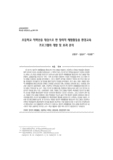

-
 * 본 문서는 배포용으로 복사 및 편집이 불가합니다.
* 본 문서는 배포용으로 복사 및 편집이 불가합니다.
미리보기
서지정보
· 발행기관 : 이화여자대학교 교과교육연구소
· 수록지 정보 : 교과교육학연구 / 16권 / 4호
· 저자명 : 신명주, 김종우, 이상원
목차
I. 서 론
II. 이론적 배경
III. 연구 내용 및 방법
IV. 연구결과 및 논의
V. 결론 및 제언초록
본 연구는 창의적 체험활동용 환경교육 프로그램을 개발하고 초등학교 저학년 학생들의 환경친
화적 태도에 미치는 효과를 검증하는데 그 목적이 있다. 본 연구의 목적을 달성하기 위하여 초등학
교 2학년 1개 학급 28명을 대상으로 20차시에 걸쳐 창의적 체험활동용 환경교육 프로그램을 적용
하였다. 실험집단을 대상으로 사전⋅사후 검사지를 이용하여 수집된 자료들을 SPSS 12.0 통계 프
로그램을 이용하여 결과를 분석하였다. 그리고 정량적 분석을 보완하기 위하여 연구자의 참여 관
찰, 학생들의 포트폴리오 및 면담을 통해 정성적 자료를 분석하였다. 연구 결과, 첫째, 개발된 창의
적 체험활동용 환경교육과정 모형은 1차원을 교육과정 유형, 2차원을 교육과정 접근, 3차원을 교육
과정 내용으로 설정하였다. 둘째, 초등학교 저학년을 대상으로 한 창의적 체험활동용 환경교육 프
로그램은 주제선정 및 교수⋅학습 지도안 및 활동지를 개발하여 현장교사에 대한 조사 연구와 전
문가의 자문을 받아 수정⋅보완하였다. 셋째, 개발된 프로그램을 적용후, 학생들은 정의적 및 행동
적 요소를 포함한 환경친화적 태도에 유의하게 향상되는 것으로 나타났다. 그리고 정성적 분석 결
과, 개발된 프로그램을 진행하는 동안 학생들은 자신의 삶과 주변 환경의 밀접한 관련성에 대해 인
식하였을 뿐만 아니라 일상생활에서도 환경친화적 행동을 실천하고자 노력하는 모습을 보였다. 이
러한 연구를 종합해 볼 때, 본 연구에서 개발된 창의적 체험활동용 환경교육 프로그램은 초등학교
저학년 학생들에게 환경친화적 태도를 향상에 효과적인 수업 방법이라 할 수 있으므로 초등학교에
서 환경교육이 보다 활발하게 이루어지기 위해서는 창의적 체험활동용 프로그램을 체계적으로 실
시하기 위한 심층적인 연구와 교수⋅학습 활동에 관한 후속 연구가 필요하다고 사료된다.영어초록
The purpose of this study was to develop an environmental education program for creative
activities in the lower grades of elementary school. The methods of this study were literature
review, evaluation of elementary environmental education experts, and a field test. In addition,
a qualitative analysis was also conducted to complement the quantitative analysis through
portfolios, observations, and interviews.
The results of this study are as follows. First, the development of the curriculum design
model was based on a theory of an environmental education program which uses creative
activities. Second, the post-test was more effective in prompting a pro-environmental attitude
compared to the pre-test. Third, the students were concerned and interested in the
environmental learning, and they demonstrated positive attitudes and participation toward the
environment and environmental problems. The creative activities for this environmental
education program indicated an ability to promote active learning participation and various
positive actions.
In conclusion, this environmental education program for creative activities had a positive
effect on the pro-environmental attitude of the lower grade elementary school students. It is
therefore suggested, as a follow-up activities, that more intensive research related this study be
conducted, linking both teaching and learning methods.참고자료
· 없음태그
-
자료후기
-
자주묻는질문의 답변을 확인해 주세요

꼭 알아주세요
-
본 학술논문은 (주)학지사와 각 학회간에 저작권계약이 체결된 것으로 AgentSoft가 제공 하고 있습니다.
본 저작물을 불법적으로 이용시는 법적인 제재가 가해질 수 있습니다. -
해피캠퍼스는 구매자와 판매자 모두가 만족하는 서비스가 되도록 노력하고 있으며, 아래의 4가지 자료환불 조건을 꼭 확인해주시기 바랍니다.
파일오류 중복자료 저작권 없음 설명과 실제 내용 불일치 파일의 다운로드가 제대로 되지 않거나 파일형식에 맞는 프로그램으로 정상 작동하지 않는 경우 다른 자료와 70% 이상 내용이 일치하는 경우 (중복임을 확인할 수 있는 근거 필요함) 인터넷의 다른 사이트, 연구기관, 학교, 서적 등의 자료를 도용한 경우 자료의 설명과 실제 자료의 내용이 일치하지 않는 경우
“교과교육학연구”의 다른 논문도 확인해 보세요!
-
체육과 교육과정에 대한 초등교사의 관심 변화 과정 탐구 22 페이지
본 연구는 내러티브 탐구라는 질적 연구 방법을 통해 체육과교육과정을 적용하는 과정에서 나타 나는 초등 교사의 관심사가 무엇인지를 밝히고 교사 관심의 변화 과정을 교사를 포함한 교육 요소 들의 상호작용이라는 맥락 속에서 파악하는데 목적이 있다. 이를 위해 교육과정에 대한 관심 변화 를 풀어낼 수 있는 연구 참여자 한 명을 대상으로 2011년 2월부터 2.. -
고등학생들의 수학적 언어 유형 및 수학적 언어와 Polya의 문제 해결 4단계의 관련성 분석 29 페이지
본 연구에서는 고등학생들이 사용하는 수학적 언어를 문제의 내용과 행동 영역으로 분석하고, Polya의 문제 해결 4단계와의 관련성을 분석하였다. 이를 위해 수학적 언어를 명시적 언어, 관계적 언어, 관계적 상징, 함수적 언어 등 4가지 유형으로 나누고, 문항의 내용 영역에서 해석학과 기하 학, 행동 영역에서 계산, 이해, 추론(증명), 내적 문제 해결.. -
장르에 따른 dictogloss 활동이 한국 중학생들의 영어 듣기 능력과 태도에 미치는 영향에 관한 연구 24 페이지
영어 듣기 능력 향상에 긍정적인 효과가 있는 것으로 여겨져 온 dictogloss 활동이 장르에 따라 어떠한 효과가 있는지에 관한 연구는 매우 부족한 편이다. 본 연구의 목적은 장르에 따른 dictogloss 활동이 한국 중학생의 영어 듣기 능력과 정의적 태도에 미치는 영향을 알아보는 것에 있다. 이를 위하여 중학생 60명을 대상으로 8주 동안 총 1.. -
교원능력개발평가에서 과학 교사의 수업 능력 평가를 위한 이해당사자 기반의 평가 관점 분석 20 페이지
교원능력개발평가가 2010년부터 학교 현장에 도입되어 시행되고 있는데, 교사의 수업 능력에 대한 평가 시 모든 교과의 교사에게 동일한 평가 지표가 적용되고 있는 실정이다. 따라서 새로운 교원평가시스템이 교원의 능력 개발 및 전문성 신장에 긍정적인 발전 방안을 제시하기 위해서는 교과 별 특성이 반영된 평가 지표를 바탕으로 교사의 수업에 대한 평가가 이루.. -
과학 교과에 적용되는 창의⋅인성 교육에 대한 교사들의 인식 22 페이지
본 연구에서는 2009 개정교육과정에서 미래 사회의 핵심 키워드로 제시한 창의⋅인성 교육에 대한 중⋅고등학교 과학 교사들의 인식과 창의⋅인성 교육 방법, 평가 방법 및 발전 방향에 대한 의 견을 알아보았다. 연구 대상으로 현재 전국 중⋅고등학교 과학 교사 138명을 선정하여, 설문 조사를 실시하였다. 본 연구..
문서 초안을 생성해주는 EasyAI

